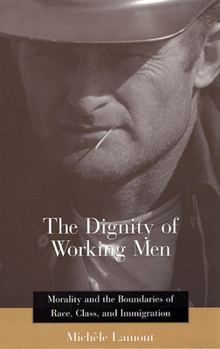The Dignity of Working Men: Morality and the Boundaries of Race, Class, and Immigration
Select Format
Select Condition 
Book Overview
Mich le Lamont takes us into the world inhabited by working-class men--the world as they understand it. Interviewing black and white working-class men who, because they are not college graduates, have limited access to high-paying jobs and other social benefits, she constructs a revealing portrait of how they see themselves and the rest of society.
Morality is at the center of these workers' worlds. They find their identity and self-worth in their ability to discipline themselves and conduct responsible but caring lives. These moral standards function as an alternative to economic definitions of success, offering them a way to maintain dignity in an out-of-reach American dreamland. But these standards also enable them to draw class boundaries toward the poor and, to a lesser extent, the upper half. Workers also draw rigid racial boundaries, with white workers placing emphasis on the "disciplined self" and blacks on the "caring self." Whites thereby often construe blacks as morally inferior because they are lazy, while blacks depict whites as domineering, uncaring, and overly disciplined. This book also opens up a wider perspective by examining American workers in comparison with French workers, who take the poor as "part of us" and are far less critical of blacks than they are of upper-middle-class people and immigrants. By singling out different "moral offenders" in the two societies, workers reveal contrasting definitions of "cultural membership" that help us understand and challenge the forms of inequality found in both societies.Format:Paperback
Language:English
ISBN:0674009924
ISBN13:9780674009929
Release Date:October 2002
Publisher:Harvard University Press
Length:408 Pages
Weight:1.15 lbs.
Dimensions:0.9" x 5.6" x 8.9"
Customer Reviews
1 rating
A 20th-Century, Female deTocqueville!
Published by Thriftbooks.com User , 20 years ago
In this book, LaMont asks white and black, American, working-class men about those they consider immoral and around whom they set boundaries. Eventually, she results in describing how these men conceive of race, immigration, and class in this country. She then compares these two groups with white French and North African counterparts, respectively.This was impressive sociology and cross-cultural analysis. Lamont found a way to assess nebulous ideas like morality and show how they help to shape very concrete lived experiences like race. The author is great at juggling multifaceted identity matters, unlike most writers who can only deal with "one issue at a timie." She quotes few other scholars, so this book read quickly and would be much more accessible, even to its subject population, than other academic books.Her analysis of black American men and North African men was very fair. Still, when she described men's lives in details, she usually referred to her white subjects. She states that neither white nor black American men think much about immigrants. However, she was studying subjects in New York and New Jersey. Things may have been quite different if she were studying California or Texas, and even she implies as much.It's not that I like how many writer blab ad nauseum about their "positionality." However, I wish this author would have discussed herself more. In this postmodern age, most researchers have abandoned pretending they are not there and the evidence speaks for itself. She never explains whether being a woman helped or hurt in getting American and French men to open up to her. How does she know that black or Arabic men didn't say to her what they would expect that a white, class-privileged, French woman academic would want to hear? She never even explains why she limited her study only to men. This was unintentional men's studies. It's particularly shocking in that working-class American women, at least, often don't have the choice to not work. She never explains why she would even want to leave them out of the picture.Just like her own last name, she writes French names in a surprising way. Lebleu without the B in upper case? Lheureux rather than L'Heureux? Maybe this is a new trend now that France is a member of the European Union.I really enjoyed this book. In this country, almost everybody identifies with the middle class and this comes at the detriment to poor folk. Further, there is not enough writing about Arabic men in the West, particularly in English. So Lamont's study is a much-needed text. It would be fascinating to hear what French readers have to say about it.





